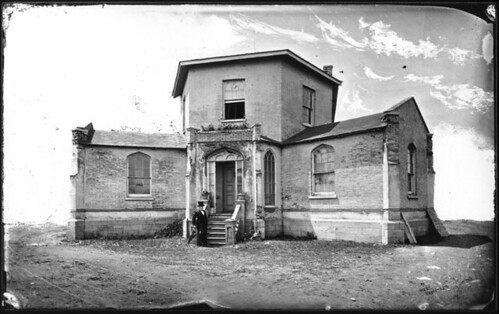 |
APPEAR 3: to have an outward aspect : seem <appears happy enough> |
“How did you think it would appear?”
Lucas said, “Castle? Dark tower? Mc-Bloody-Donalds?”
His
companion, a tanned athletic man shrugged.
“Worse,” he said, “You said the Enemy is a corruptor, destroyer. This is... business.” They were facing a large building with a gabled roof. Modern paintwork gleamed with the corporate smile of welcome. Trust me, it said.
“Business,” Lucas said, as someone may have said ‘tumour’. “Anyway, the incursion’s only starting here. Some time until the enemy takes control. Hundred years, maybe more.”
They crossed the car park and walked up some stone steps toward the glazed reception area, a modern growth on old stone.
“The girl, Xam, is here?” the warrior said. He sounded eager.
“You liked her, eh?” Lucas said, “Well, yes and no. One of her is here, but not her. Xam doesn’t travel, she just... is.”
The two men stepped into the lobby. Old photographs showed the building as it had once been, monochrome, grim, braced to spring, glowering windows dark and watchful. The receptionist was a slim woman in her forties with neat blonde hair and a fetching pressed-blouse efficiency.
“Samantha Kettlewell,” said Lucas looking at her badge, “No appointment I’m afraid, we’re here to wreak havoc.”
“When did you ever do anything else?” she said, then she looked at the other man and grinned. “Hello again. Sleep well?” Her voice was innocent, her eyes more truthful.
“Worse,” he said, “You said the Enemy is a corruptor, destroyer. This is... business.” They were facing a large building with a gabled roof. Modern paintwork gleamed with the corporate smile of welcome. Trust me, it said.
“Business,” Lucas said, as someone may have said ‘tumour’. “Anyway, the incursion’s only starting here. Some time until the enemy takes control. Hundred years, maybe more.”
They crossed the car park and walked up some stone steps toward the glazed reception area, a modern growth on old stone.
“The girl, Xam, is here?” the warrior said. He sounded eager.
“You liked her, eh?” Lucas said, “Well, yes and no. One of her is here, but not her. Xam doesn’t travel, she just... is.”
The two men stepped into the lobby. Old photographs showed the building as it had once been, monochrome, grim, braced to spring, glowering windows dark and watchful. The receptionist was a slim woman in her forties with neat blonde hair and a fetching pressed-blouse efficiency.
“Samantha Kettlewell,” said Lucas looking at her badge, “No appointment I’m afraid, we’re here to wreak havoc.”
“When did you ever do anything else?” she said, then she looked at the other man and grinned. “Hello again. Sleep well?” Her voice was innocent, her eyes more truthful.
He
frowned. “Yes, but... Xam?”
“Slept very well,” Kettlewell said. The warrior swallowed. Yesterday she’d been younger, stranger, and far different in Context.
“Aye well, enough,” said Lucas, “How long till the Enemy’s real enough to face?”
“A century and a half,” Kettlewell said, “I’m picking up echoes. It’s going to be grim.”
“Which way?”
“Slept very well,” Kettlewell said. The warrior swallowed. Yesterday she’d been younger, stranger, and far different in Context.
“Aye well, enough,” said Lucas, “How long till the Enemy’s real enough to face?”
“A century and a half,” Kettlewell said, “I’m picking up echoes. It’s going to be grim.”
“Which way?”
“Downline,” said Kettlewell, “the place is a workhouse then. I think I’m an inmate. It’s obscured I’m afraid. The Enemy is wary.”
“It should be,” Lucas said, “Come on big fella, let’s go cause mayhem.”
The two men departed silently. Samantha answered a ringing phone. Routine.
*
The image above, which is copyright Peter Higginbotham, is of a property in Whitby, North Yorkshire in the United Kingdom which is now a shared premises for a number of small businesses. Prior to that it was a fever hospital. Prior to that it was a workhouse for the lodging of the destitute and hopeless. Local stories suggest the place is haunted, but there are stranger things than ghosts lingering in the shadows and hauntings aren't always one way things.






